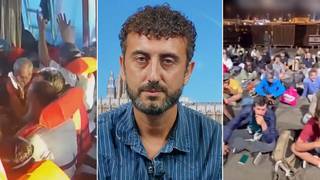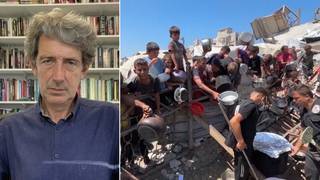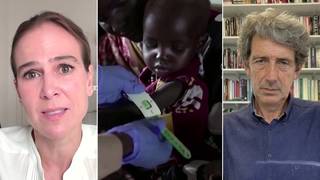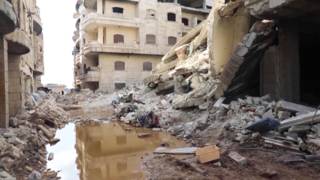
Topics
Guests
- Peter Balakianprofessor of humanities at Colgate University and author of The Burning Tigris: The Armenian Genocide and America’s Response
- Anahid Katchianher father was a survivor of the 1915 Armenian genocide. She has interviewed 44 survivors in the United States.
- Simon Maghakyana lecturer in political science at the University of Colorado and activist with Armenians of Colorado.
This week marks the 100th anniversary of the Armenian genocide. On April 24, 1915, the Young Turk government of the Ottoman Empire began a systematic, premeditated genocide against the Armenian people — an unarmed Christian minority living under Turkish rule. An estimated 1.5 million Armenians were exterminated through direct killing, starvation, torture and forced death marches. Another million fled into permanent exile. Today, the Turkish government continues to deny this genocide, and since becoming president, President Obama has avoided using the term “genocide” to describe it. We’re joined by Peter Balakian, professor of humanities at Colgate University and author of “The Burning Tigris: The Armenian Genocide and America’s Response”; Anahid Katchian, whose father was a survivor of the 1915 Armenian genocide; and Simon Maghakyan, an activist with Armenians of Colorado. We also play a recording of Armenian broadcaster and writer David Barsamian’s mother recalling her experience during the Armenian genocide as a young girl. Araxie Barsamian survived, but her parents and brothers did not.
Transcript
AMY GOODMAN: This is Democracy Now!, democracynow.org, The War and Peace Report. I’m Amy Goodman. We’re on the road in Denver, Colorado. This week marks the hundredth anniversary of the Armenian genocide. On April 24, 1915, the Young Turk government of the Ottoman Empire began a systematic, premeditated genocide of the Armenian people, an unarmed Christian minority living under Turkish rule. An estimated 1.5 million Armenians were exterminated through direct killing, starvation, torture and forced death marches. Another million fled into permanent exile. An ancient civilization was expunged from its homeland of 2,500 years.
Today, the Turkish government continues to deny the genocide. Books about the slaughter are banned in Turkey, and its government lobbies heavily in the United States, as well, against congressional resolutions on genocide.
In a minute, we’ll be joined by three guests, but I first want to turn to a recording of Armenian broadcaster and writer David Barsamian’s mother recalling her experience during the Armenian genocide as a young girl. Araxie Barsamian survived, but her parents and brothers did not. In 1986, she told her story to a history class at the University of Denver. She’s introduced by the well-known broadcaster of Alternative Radio, her son, David Barsamian.
DAVID BARSAMIAN: Now you will hear eyewitness testimony from Araxie Barsamian, my mother. She survived the Turkish genocide of the Armenians. Her parents, four brothers and members of her extended family were not so fortunate.
Araxie was born in the village of Dubne, north of the historic Armenian city of Dikranagerd, now called Diyarbakir. Her parents were Giragos and Mariam Giragosian. Her younger brothers were Sarkis, Mardiros, Hovsep and Tavit. Unaware of the looming calamity about to envelop her, she remembers an omen. Early in 1915, the village was covered with grasshoppers. Elders said it was a bad sign. A few months later, the wheat was ripe and about to be harvested, when the end came. The Turks came to the village, took all the men and young boys, marched them outside of town and shot them. The remaining women and children were told to assemble at the church. They were going to be “resettled”—that was the euphemism for deportation—to the uninhabitable desert wastes hundreds of miles to the south. They were to walk to their new homes. Promises that they would be protected en route were quickly broken. The defenseless caravans were waylaid and attacked throughout the deportation march. Girls were kidnapped and raped. Starvation and disease took care of many of those the Turks did not kill.
Araxie walked as far as the city of Urfa, where she was separated from her mother, brothers and other relatives. She eventually found her way into an orphanage in Aleppo in northern Syria. In August 1921, she married my father, Bedros Barsamian, in Beirut. Three months later, they were living in a tenement walk-up on Horatio Street in New York’s West Village. The following year, at 17, she had the first of her four children.
In 1986, just a few months before her death, Araxie spoke to a history class at the University of Colorado at Denver. I was there with her. She begins by describing what happened to her father.
ARAXIE BARSAMIAN: When we left, my family was 25 in the family. They took all the men folks. They ask my father, “Where is your ammunition?” He says, “I sold it.” So, he says, “Go get it.” So when he went in [inaudible] town to get it, they beat him, and they took him, all his clothes. And when he came back—this is my mother tells me the story. When he came back, their body—he went in jail. They cut his arms. “Where’s the ammunition?” He says, “I haven’t got it. They didn’t give me.” So he die in jail.
And all the mens, they took all the mens in the field. They tied their hands, and they shooted, killed them, every one of them. I remember they collect the only 15-years-old boys, left just like this. They were sitting, and their hands are tied back. And they took in a field. They shoot them, too. Nothing left, only women and small children.
We deported in some city. There, food, nothing to eat. They took everything from us. They say, they put in a church, “When you come back, we’ll give you back,” which is not true. So we went to some city. My aunt gave birth. They left—she left her baby over there. And then we walk, walk, walk, so many, no water. I remember my mother used to—had handkerchief and, excuse me, horse urine, and wipe our mouth. We were so dry. Just think that. I forgot lots things. If I remember things, day and night I tell, not finish.
AMY GOODMAN: That was Araxie Barsamian, mother of the well-known radio broadcaster and writer, David Barsamian. She’s a survivor of the Armenian genocide. David lives in Boulder, Colorado, where he hosts Alternative Radio. But he’s overseas today commemorating the hundredth anniversary.
For more, we’re joined by three guests. Here in Denver, Anahid Katchian’s father was a survivor of the 1915 Armenian genocide. She has interviewed 44 survivors here in the United States. And Simon Maghakyan is a lecturer in political science at the University of Colorado and activist with Armenians of Colorado. In New York, Peter Balakian joins us, professor of humanities at Colgate University, author of The Burning Tigris: The Armenian Genocide and America’s Response. His new books include the poetry collection, Ozone Journal, about trauma, memory and art, and Vise and Shadow, a collection of profiles of Armenian poets and artists who were killed or affected by the genocide. His op-ed in the Los Angeles Times is headlined “On Armenian genocide, go ahead and offend Turkey.”
We welcome you all to Democracy Now! Peter, I want to begin with you. Why is the Armenian genocide so difficult for many in the United States to get accurate information on?
PETER BALAKIAN: Well, I really think there’s been an amazing kind of development of scholarship over the last 25 years. I think right now the bibliography on the Armenian genocide is impressive, and there are amazing works of scholarship from scholars around the world, from different archives and different cultures. So, I do think there’s been an enormous recovery of this history, which had been more obscured, I suppose, more lost, in the 1970s and ’80s. But now I think that the frequency of teaching the Armenian genocide in the curriculum around the country, both in high school and at the university level, is on its way to becoming almost standard in certain kinds of courses, and especially in courses that deal with the World War I era or that deal in genocide and human rights studies and issues.
AMY GOODMAN: What does the Turkish government say today?
PETER BALAKIAN: Well, you know, the Turkish government’s denialism has been a consistent policy from really the time of the event. I mean, even at the time, the minister of the interior, Talaat, was engaged in wholesale denial of the mass killings as they were happening on the spot. He was trying to bury skeletons and bones from European inspectors. And Turkey has persisted in a deeply misguided kind of nationalist project, in which they’re incapable of dealing with this enormous crime that’s lodged at the very cornerstone of their modern history. They continue to have a state-educated—a state-mandated education system, in which there is no critical analysis allowed or permitted in the curriculum. And for the most part, the genocide of the Armenians is ignored, or it is given two or three sentences in which the Armenians are vilified and blamed for their own fate. I do think that behind this—
AMY GOODMAN: And how does Turkey—Peter, how does Turkey affect academia, people learning this, in the United States?
PETER BALAKIAN: Well, again, here, I’m happy to say we have seen an amazing shift. Twenty, 25 years ago, there was still what I would call a pernicious kind of Turkish nationalism that infested the teaching of Middle Eastern studies. And Ottoman studies was really under the tight control of Ankara. That has passed. There’s a new generation of young, talented Ottoman scholars, Middle East scholars, and, of course, many, many other scholars in different fields. But the breakthrough in the Ottoman studies world has been really noticeable. So I think what was once a more pernicious situation is less so. Nevertheless, there are still official kind of state-involved Turkish deniers out there, and they exist in a few pockets around the nation. And I think, slowly, that will erode, because they remain on the wrong side of truth, critical inquiry and history.
AMY GOODMAN: Simon Maghakyan, talk about what’s happening here in Denver at the State Capitol.
SIMON MAGHAKYAN: This afternoon, Governor Hickenlooper and the Armenian community will unveil an Armenian genocide monument on State Capitol grounds in memory of all crimes against humanity.
AMY GOODMAN: How did this happen?
SIMON MAGHAKYAN: It started three years ago when the Armenian community was offered a donation by a man named Alexander Ter-Hovakimyan from Armenia. And we already had a garden installed by Armenians of Colorado in 1982, so building on that project, we were able to work with the state, get the General Assembly’s and the governor’s support, to bring this beautiful monument to Colorado.
AMY GOODMAN: What does it look like?
SIMON MAGHAKYAN: It’s a khachkar. It’s intricately carved, has different symbols on it of different faiths. It’s actually a replica of a monument that was destroyed only 10 years ago.
AMY GOODMAN: And can you talk about your own family history?
SIMON MAGHAKYAN: My family is from Urfa. That’s where Araxie Barsamian was taken where they were taken on the march. It’s a magical place, the homeland of Abraham and my ancestors, Hagop and Khatun [phon.]. Hagop was a soldier in the Ottoman army. And when he returned home in 1918, no one welcomed him or thanked him for his service. He had no idea that the Armenian genocide had been going on. And his entire family had been either wiped out or driven out, except for his would-be wife, Khatun, who was hiding and living secretly with a kind Turkish widow. And my would-be great-grandmother was rescued, and the two met in Aleppo years later. And that’s where my grandfather and his three brothers were born.
AMY GOODMAN: Anahid Katchian, can you talk about your family’s history, particularly your father and what happened to him?
ANAHID KATCHIAN: My father, Azad Katchian, was six at the time of the genocide, at the beginning. They lived in the northern Black Sea coast, sea coast, city of Trabizon. And when they realized they must flee, they went to the port and were told the last boat that allowed Armenians left this morning and would not—they missed the boat by half a day. And from that, they were taken—he was taken with his sister—six years old, four years old—to a place that did take children. We do not know exactly where this place was, but they were left at a place that took children.
And from that place, eventually, he was, with other children his age, put on a march. He was told, “We’re going out on a picnic.” They started out, and the march began. He was, as a child, put on the march for several years through the mountains, walking, walking, walking. Like Araxie was saying, the parching—more than hunger was the thirst. The walking, blistering his feet. He had scars to the end of his life on his foot. But he survived. He survived.
He was taken by different Arab families, even Turkish families. And he always recognized that there was help from certain—certain Turks did help him—and then put back on the march, until the end of World War I, when Near East Relief Americans helped him get on his feet, helped him and thousands of other orphans who had survived, but bedraggled, really truly bedraggled. But Americans helped him get back on his feet. He was taken to an orphanage in Beirut, where Dr. Stanley Kerr and his wife Elsa raised him all the way, educating him in Beirut all the way through medical school at the American University of Beirut.
AMY GOODMAN: Peter Balakian, you are a poet as well as an author. I was wondering if you could share a poem about the Armenian genocide?
PETER BALAKIAN: I’m happy to. And in light of the beautiful and moving stories of survivors that you have brought together today, I’d like to read a short poem of mine called “After the Survivors Are Gone.”
I tried to imagine the Vilna ghetto,
to see a persimmon tree after the flash at Nagasaki.
Because my own tree had been hacked,
I tried to kiss the lips of Armenia.
At the table and the altar
we said some words written ages ago.
Have we settled for just the wine and bread,
for candles lit and snuffed?
Let us remember how the law has failed us.
Let us remember the child naked,
waiting to be shot on a bright day
with tulips blooming around the ditch.
We shall not forget the earth,
the artifact, the particular song,
the dirt of an idiom—
things that stick in the ear.
SIMON MAGHAKYAN: Beautiful.
AMY GOODMAN: Your thoughts, Simon, when you listen to Peter?
SIMON MAGHAKYAN: Peter so well connects the history of what happened to us to the suffering of many more around the world. And it is very important to understand that the Armenian genocide is what defined the international laws of crimes against humanity and genocide. And it is important to recognize all the atrocities that have been committed by governments against the very people they were supposed to protect.
AMY GOODMAN: The pope’s statement on the Armenian genocide, Anahid, what did that mean to you?
ANAHID KATCHIAN: It was a light. It was a spotlight that was so very, very energizing. My father would have been absolutely enthralled by it. All he wanted was recognition, acknowledgment by the powers that be in Turkey now. And the pope spoke to it. He gave voice to it in a public arena, wide arena.
AMY GOODMAN: What, Simon, do you want Americans and people around the world to understand on this hundredth anniversary of the beginning of the Armenian genocide?
SIMON MAGHAKYAN: I want everyone to understand that the cycle of genocide will continue unless we recognize the injustices of the past. Hitler is famously quoted as saying, “Who, after all, remembers the Armenians?” before he launched the attack on Poland. We have to recognize the history and the trauma that the Armenian people face to this day.
AMY GOODMAN: Well, I want to thank you all for being with this. Anahid, will you be also at the State Capitol today?
ANAHID KATCHIAN: Very much so.
AMY GOODMAN: Is there a large Armenian community here in Denver?
SIMON MAGHAKYAN: Yes.
AMY GOODMAN: Well, I want to thank you all. Peter Balakian in New York, professor of humanities at Colgate University, author of The Burning Tigris: The Armenian Genocide and America’s Response. Anahid Katchian, thank you for joining us, whose father was a survivor of the 1915 Armenian genocide. She’s interviewed scores of survivors in the United States. And Simon Maghakyan, lecturer in political science at the University of Colorado, activist with Armenians of Colorado.
That does it for our broadcast. Monday through Wednesday, we’ll be broadcasting from The Hague. So do tune in.












Media Options